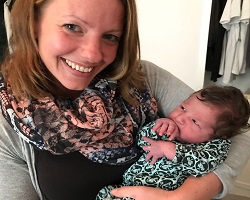Renate de Bie – a Dutch midwife shares her experiences of safe and peaceful home births

Renate de Bie
The Dutch tradition of giving women with low-risk pregnancies the right to choose where to give birth, including at home, is quite unique.
“Pregnancy is not an illness. We midwives are the experts in birthing physiology and the gatekeepers of transferrals to secondary care,” explains Renate de Bie, a 36-year-old midwife from Utrecht. “The underlying principle is to have a physiological approach to childbirth and not over-medicalize it. We guide women through pregnancy, birth and the post-partum period, and only turn to hospitals if we identify a medical complication.”
Maternity care in the Netherlands is organized according to a primary, secondary and tertiary care model, where primary care, often delivered in the community, is led by independently practicing midwives. The secondary and tertiary levels are provided in a hospital setting, but only when certain conditions apply. Midwives refer to a national document that provides guidelines to identify the required level of care depending on certain risks of complications.
Home-birthing: an intimate and safe experience
Renate has worked for 8 years as part of a midwife practice, assisting women giving birth, including in their own home. Though she has now been working in a secondary care hospital for over 2 years, Renate talks fondly of her experiences in home-birthing.
“I always loved arriving in a dark street in the middle of the night, where everyone was asleep, unaware that something special was about to happen. I’d spot a solitary light and think – ‘That’s where I need to go’. The whole experience is so intimate, there can be such a tranquillity around giving birth, where the woman is completely in her mantra. Having been welcomed into a family’s home and bedroom, I’d feel so privileged to have been given their complete trust. Driving home the sun would rise and I’d feel like I was myself radiating, considering the unique experience I had witnessed. As the city would come alive I’d think, ‘People are going to work and students returning from a night out, while I just helped a baby into the world’. Assisting a birth always feels magical.”
We know what we are doing
“Midwives undergo a rigorous education process; we know what we are doing. We are highly trained in recognizing complications in a timely manner and acting accordingly. I was once called to a birth during which several complications occurred and there was no time to go to the hospital due to the quick arrival of the baby. Having anticipated the complications, I had alerted various health personnel – my colleagues, ambulance workers and the hospital – so everyone involved could cooperate smoothly and do what they were trained to do. By the end, both the baby and the mother were safe and stable when we transferred them to the nearby hospital. Even though we had to ventilate the baby and administer a drip to the haemorrhaging mother, the family later revealed that they had not once, not for one second, felt unsafe. I think that is the best compliment you can get. Driving home, I remember my colleague and I saying, ‘This is why we do what we do, this is why we are trained, and this is where we make a difference’.”
A holistic, people-centred approach
Renate emphasizes the key role of infrastructure in enabling the system to work. “We are a small country with an excellent infrastructure – hospitals are always close by and when midwives do need to signal a medical complication, action can be taken promptly and in close collaboration between all health-care workers involved.”
“One of the special figures, essential to the Dutch maternity care system, is the ‘kraamverzorgende’, a maternity assistant who can aid midwives during home-birthing. They also stay with the newborn’s family during a lying-in period to help manage the postnatal care. The assistants are present for a few hours during and after the birth, then they are available to return daily for 8–10 days, staying a minimum of 4 hours per day. They are our eyes and ears, they can signal if something is wrong with the baby or the mother and they also monitor the social and psychological factors in the newborn’s environment.”
“It is important to keep fighting for our system, for it to be holistic, physiologically approached and person-centred. We midwives do that best. Most births nowadays occur in hospitals and are overseen by a midwife without the presence of physicians if no complications occur. Fortunately, there are more and more midwives in hospitals now, who always have the mother’s autonomy and physiology in mind. I’d want decision-makers to listen to the mothers, who are increasingly advocating for their own right to decide what is best for them, and to truly consider what good care really means.”



